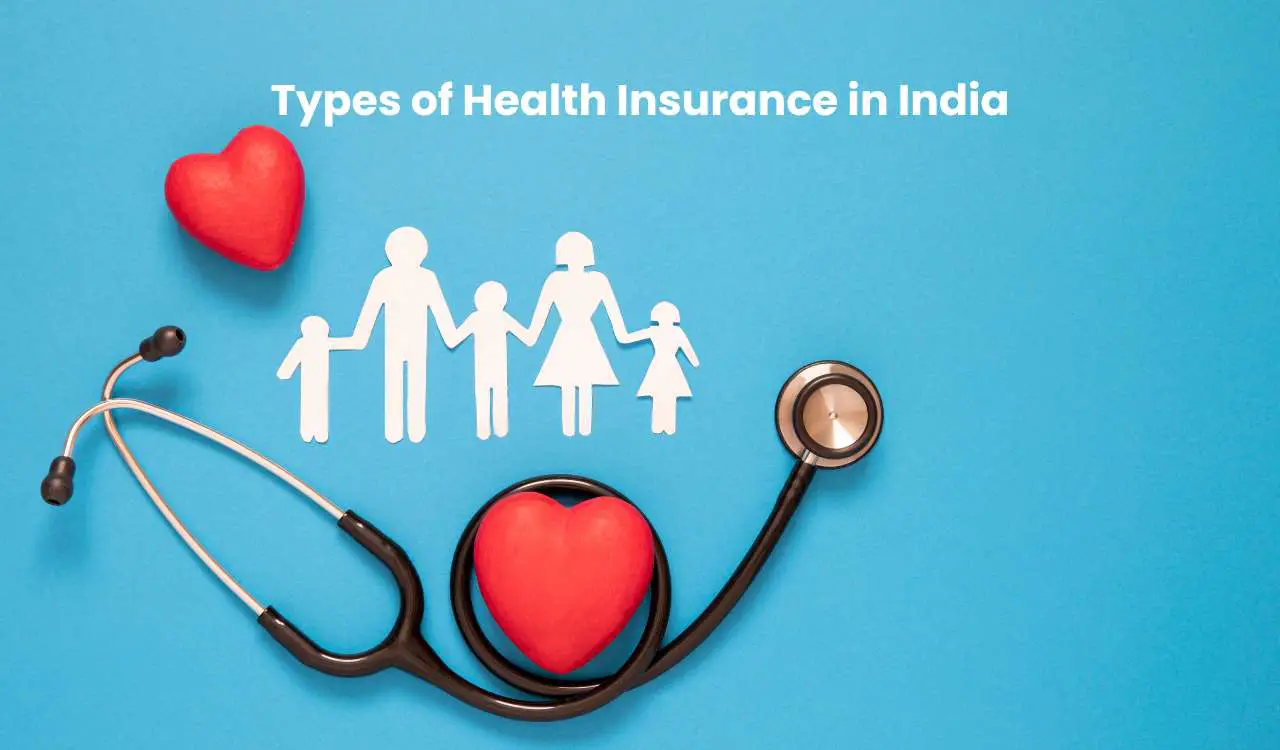
With the rise in health issues, treatment costs have skyrocketed. Consequently, the demand for health insurance plans has surged. Many types of health insurance policies are available in the market, helping you avoid financial strain. These plans ensure you receive the best treatment without worrying about expenses. Understanding different types of health insurance plans in India is crucial for making an informed decision.
Types of Health Insurance Plans in India
| Types of Health Insurance Plans | Suitable For |
|---|---|
| Individual Health Insurance | Individuals |
| Family Health Insurance | Entire Family – Self, Spouse, Children, and Parents |
| Critical Illness Insurance | Expensive treatments for life-threatening diseases |
| Senior Citizen Health Insurance | Citizens aged 65 and above |
| Top Up Health Insurance | Additional coverage when existing policy limits are exhausted |
| Hospital Daily Cash | Daily hospital expenses |
| Personal Accident Insurance | Loss or damage due to accidents |
| Mediclaim | In-patient expenses |
| Group Health Insurance | Employees of an organization |
| Disease-Specific Insurance | Conditions like pandemics (e.g., COVID-19) |
| ULIPs | Dual benefits of insurance and investment |
Individual Health Insurance
Individual Health Insurance is designed for a single person. It covers hospitalization, surgery, pre and post-medication expenses up to the insured limit. The premium is based on the buyer’s age and medical history.
Key Features:
- Covers a single individual.
- Can include family members by paying an additional premium.
- Waiting period of 2-3 years for pre-existing illnesses.
Family Health Insurance
Family Health Insurance, also known as the Family Floater Plan, covers the entire family under one policy. It insures all family members, including the spouse, children, and parents. One premium covers everyone.
Key Features:
- Covers the entire family.
- Premium is based on the eldest family member’s age.
- Avoid adding members above 60 to keep premiums low.
Critical Illness Insurance
Critical Illness Insurance provides a lump sum amount for life-threatening diseases. It doesn’t require hospitalization for claims; a diagnosis suffices.
Covered Diseases:
- Cancer
- Major organ transplant
- Kidney failure
- Stroke
- Multiple sclerosis
- Paralysis
- Heart attack
A person older than 65 with Insurance
A person older than 65 and above. It covers hospitalization, medicines, domiciliary hospitalization, and psychiatric benefits. Premiums are higher due to increased health risks.
Key Features:
- Coverage for those aged 65 and above.
- Includes hospitalization and post-treatment expenses.
- Premiums are higher.
Top Up Health Insurance
Top Up Health Insurance provides additional coverage over the existing policy with a deductible clause. Super Top-Up plans offer further coverage once the regular policy’s sum is exhausted.
Key Features:
- Additional coverage for higher amounts.
- Deductible clause.
- Super Top-Up is available.
Hospital Daily Cash
Hospital Daily Cash offers a daily cash benefit for hospital expenses. It provides a fixed amount daily, reducing financial strain during hospitalization.
Key Features:
- Daily cash benefits range from Rs. 500 to 10,000.
- Additional benefits like convalescence and parental accommodation.
Personal Accident Insurance
Personal Accident Insurance covers expenses due to accidents, including disability and death. It provides a lump sum amount for the insured or their family.
Key Features:
- Coverage for accidents, including death and disability.
- Additional benefits like education and orphan benefits.
- Loan obligations covered.
Mediclaim
Mediclaim covers in-patient expenses due to illness or accidents. It includes surgery, doctor’s fees, nursing charges, oxygen, and anaesthesia.
Key Features:
- Coverage for in-patient expenses.
- Available as group mediclaim, individual medical insurance, and overseas medical insurance.
Group Health Insurance
Group Health Insurance is provided by employers for their employees. The premium is lower than individual health insurance policies.
Key Features:
- Coverage for a group of employees.
- Lower premium compared to individual policies.
Disease-Specific Insurance
Disease-specific insurance covers particular diseases like COVID-19 (Corona Kavach) or mosquito-borne diseases (M-Care).
Key Features:
- Specific coverage for certain diseases.
- Example: Corona Kavach offers Rs. 50,000 to Rs. 5,00,000 coverage.
ULIPs (Unit Linked Insurance Plans)
ULIPs offer dual benefits of insurance and investment. A part of the premium is invested, and the rest provides health coverage.
Key Features:
- Investment and insurance benefits.
- Market-linked returns.
- Long-term financial planning tool.
Indemnity and Fixed Benefit Plans
The Indemnity Plans
Indemnity plans cover hospital expenses up to a fixed limit. Claims can be made multiple times until the limit is reached.
Types of Indemnity Plans:
- Individual Health Insurance
- Family Floater Plan
- Group Health Insurance
- ULIPs
Claim Methods:
- Reimbursement: Bills are paid by the policyholder and then reimbursed.
- Cashless: The insurance provider pays directly to the hospital.
Fixed Benefit Plans
Fixed Benefit Plans provide a set amount for specific health conditions listed in the policy.
Types of Fixed Benefit Plans:
- Personal Accident Plan
- Critical Illness Plan
- Hospital Cash Plan
Importance of Health Insurance
Financial Assistance: Health insurance provides financial support during medical emergencies.
Tax Benefits: Premiums are eligible for tax deductions under Section 80D of the Income Tax Act.
Investment and Savings: It ensures you don’t worry about treatment costs, as expenses are covered by the insurance company.
Annual Health Checkups: Some policies offer coverage for annual health checkups.
Medical Inflation: Helps manage rising medical costs without financial strain.
Coverage for Complex Procedures: Covers complex treatments like bariatric surgery.
Benefits for Organ Donors: Provides coverage for organ donation procedures.
Alternative Treatments: Covers treatments like Ayurveda, Homeopathy, and Yoga.
Things to Consider While Buying Health Insurance
Deductibles: The amount paid by the insured as part of a claim.
Age: Premiums and coverage depend on the buyer’s age.
Medical History: Family medical history impacts the premium.
Exclusions: Conditions not covered by the policy.
Sum Assured/Insured: The amount provided to the insured during a medical emergency.
Waiting Period: Time before the policy benefits can be availed.
Lifetime Renewability: Different plans offer different renewability options.
Network Hospitals: Choose a policy with a wide network of hospitals.
Claim Settlement Ratio: Opt for companies with a high claim settlement ratio.
Conclusion
Understanding the types of health insurance in India is vital. The rising cost of medical treatments makes health insurance indispensable. Evaluate different plans and choose the one that suits your needs. Comparing insurance companies and their policies is crucial to avoid paying high premiums for low returns. With the right health insurance, you can ensure financial stability during medical emergencies.
Individual Health Insurance is a policy meant for a single person, covering hospitalization, surgical, and medical expenses up to the insured limit.
Family Health Insurance covers the entire family under a single policy, including spouse, children, and parents, with one premium for all.
Critical Illness Insurance provides a lump sum amount for life-threatening diseases like cancer, kidney failure, and heart attacks, upon diagnosis.
Senior Citizen Health Insurance is designed for individuals aged 65 and above, covering hospitalization, medicines, and post-treatment expenses.
Top Up Health Insurance offers additional coverage over an existing policy, with claims made after exceeding a predefined limit (deductible).







